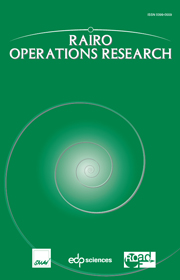Article contents
Scheduling an interval ordered precedence graph with communication delaysand a limited number of processors
Published online by Cambridge University Press: 07 March 2013
Abstract
We consider the scheduling of an interval order precedence graph of unit execution time tasks with communication delays, release dates and deadlines. Tasks must be executed by a set of processors partitioned into K classes; each task requires one processor from a fixed class. The aim of this paper is to study the extension of the Leung–Palem–Pnueli (in short LPP) algorithm to this problem. The main result is to prove that the LPP algorithm can be extended to dedicated processors and monotone communication delays. It is also proved that the problem is NP–complete for two dedicated processors if communication delays are non monotone. Lastly, we show that list scheduling algorithm cannot provide a solution for identical processors.
Information
- Type
- Research Article
- Information
- Copyright
- © EDP Sciences, ROADEF, SMAI, 2013
References
- 1
- Cited by

